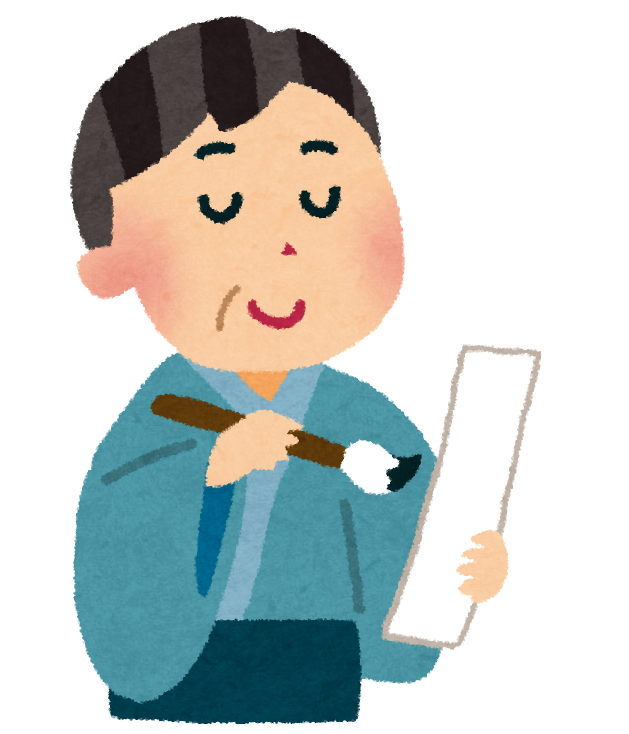Part A Self Introduction
自己紹介をしよう

A_1
Let’s introduce ourselves to each other.
My name is ________. What is your name?
A_2
I am ________. Nice to meet you.


A_3
Nice to meet you too, ________. What are you going to do this weekend?
A_4
| Answer: |


A_5
I see. Let’s begin our lesson!
Part B Vocabulary
単語を確認しよう

B_1
We’ll read aloud the words below. Please repeat after me. I will check your pronunciation.
(Please send the mispronounced words and expressions to your student.)
講師の真似をして単語を発音しましょう。
B_2
 |
included
含まれる
|
 |
poem
詩
|
 |
written
(writeの過去分詞)書いた、書かれた
|
 |
seasonal
特定の季節の
|


B_3
Great job!
Part C Role Play

C_1
I will read the situation below. Then, we will have a roleplay based on the situation.
下記のシチュエーションを読み上げます。その状況をもとにロールプレイをしましょう。

C_2
An international student came to your class. You welcome him/her and give him/her a school tour. What do you say to him/her when you meet someone for the first time?
あなたのクラスに海外から転入生がやってきました。あなたは彼の出迎えと学校案内をすることになりました。初対面の人と話すとき、あなたはなんと話しかけますか?

C_3
|
STUDENT:
|
Hi! I’m Kudo Fumiya. Nice to meet you! |
|
TUTOR:
|
I’m Oliver Davis. Nice to meet you, too! |
|
STUDENT:
|
Welcome to our school, Oliver! We’ve been looking forward to having you in our class. |
|
TUTOR:
|
I’m a bit nervous, but I’m glad to hear that. |
|
STUDENT:
|
No worries. Feel free to ask me anything if you have any questions. |
|
TUTOR:
|
Thanks, Fumiya. |
|
STUDENT:
|
So, let me show you around our school. Let’s go! |
nervous 緊張した、不安な


C_4
Great job! Now, please read the sample phrases.
素晴らしいです!
それでは、歓迎するときに使うフレーズの例を読んでみましょう。
それでは、歓迎するときに使うフレーズの例を読んでみましょう。
C_5
| 1. | We’re happy to have you here. |
| 2. | Let me know if there’s anything you need. |
| 3. |
I hope you enjoy your time in Japan! |


C_6
Good! Now, let’s roleplay another situation. Fill in the blanks to complete the dialogue.
Good! それではロールプレイをしてみましょう。空欄にはC_5で読んだ、歓迎するときに使うフレーズを入れながら読んでみましょう。

C_7
You are welcoming a foreign visitor at a festival. Talk to him/her as if he/she has come to Japan for the first time.
あなたはお祭りで外国人観光客を迎えることになりました。初めて日本に来た外国人観光客に話しかけてみましょう。
C_8
|
STUDENT:
|
Hi! Are you Ms. Wilson? |
|
TUTOR:
|
Yes. I’m Hannah Wilson. |
|
STUDENT:
|
I’m Yoshida Mako. We’re ______________ here. |
|
TUTOR:
|
Thank you, Mako. Have you been to this festival before? |
|
STUDENT:
|
Yes, I have. Let me know if _________________. |
|
TUTOR:
|
Thank you for the warm welcome. |
|
STUDENT:
|
You’re welcome. I hope ______________ in Japan! |


C_9
Your answers were fantastic! Now you can welcome people from abroad.
素晴らしいです!これで海外から来た人を歓迎することができますね。
Part D Dialogue Practice and Passage Reading

D_1
Let’s read the dialogue below.
会話文を読みましょう。

D_2
|
TUTOR:
|
What is Eri doing? I haven’t seen her since this morning. |
|
STUDENT:
|
She has been studying in her room since 9 a.m. |
|
TUTOR:
|
Oh, she’s been studying for three hours. It’s lunch time. I’m going to talk to her. |
~~ Host mother came to Eri’s room ~~
|
TUTOR:
|
Hey, Eri. What are you studying? |
|
STUDENT:
|
I’m studying Edo culture in Japan. |
|
TUTOR:
|
Wow, that’s great! Tell me about it while eating lunch! |


D_3
Now, let’s switch roles.
役割を交代しましょう。
D_4
|
STUDENT:
|
What is Eri doing? I haven’t seen her since this morning. |
|
TUTOR:
|
She has been studying in her room since 9 a.m. |
|
STUDENT:
|
Oh, she’s been studying for three hours. It’s lunch time. I’m going to talk to her. |
~~ Host mother came to Eri’s room ~~
|
STUDENT:
|
Hey, Eri. What are you studying? |
|
TUTOR:
|
I’m studying Edo culture in Japan. |
|
STUDENT:
|
Wow, that’s great! Tell me about it while eating lunch! |


D_5
Great job reading the dialogue!

D_6
Please read the passage.
続きのパッセージを読みましょう。

D_7
Many famous Japanese cultures were born during the Edo period. Kabuki in entertainment, sumo in sports, ukiyoe (Japanese painting) in art, haiku in literature, and so on. They have been important to Japanese culture since the Edo period.
Haiku have been especially enjoyed by Japanese people for centuries. Haiku are Japanese poems. It has some rules. First, it is written in a few words, not in sentences. Second, a seasonal word must be included. This makes it easier to imagine the season and nature.
literature 文学


D_8
Great job reading the passage!
Part E Comprehension Check

E_1
Now, you will answer the questions based on the passage. I will check if your sentences are complete and if the grammar is correct.
(Please send the sentences that need grammar corrections to your student.)
質問に答えてみましょう。

E_2
| How long has Eri been studying? |
E_3
| Answer: |


E_4
| Since when has haiku been an important Japanese culture? |
E_5
| Answer: |


E_6
Great job answering the questions!
Part F Asking Questions

F_1
Now, you will answer the question based on the dialogue. I will check if your sentence is complete and if the grammar is correct.
(Please send the sentences that need grammar corrections to your student.)
質問に答えてみましょう。

F_2
|
Have you read or seen any Japanese culture born in the Edo period? |
F_3
| Answer: |


F_4
|
Do you like to write any sentences/essays/poems? Why or why not? |
F_5
| Answer: |


F_6
| Is there something you’ve been doing since you were a child? How long have you been doing it? |
F_7
| Answer: |


F_8
| How long have you learned English? |
F_9
| Answer: |


F_10
Great job answering the questions!
Part G Free talk
フリートークをしてみよう

G_1
Let’s have a free talk about the following topics.
(Please have a free talk if you have time left.)
フリートークをしましょう。


G_2
|
Do you like reading? If yes, why do you like it? Please tell me about your favorite book. If not, why? What do you like to do in your free time? |
G_3
| Answer: |


G_4
|
Do you like your hometown? |
G_5
| Answer: |
